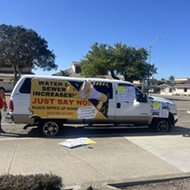[
{
"name": "Promo Temp Targeted",
"id": "PromoTempTargeted",
"class": "inlineCenter",
"insertPoint": "4",
"component": "15511697",
"requiredCountToDisplay": "0"
},
{
"name": "Ad - Medium Rectangle CC01 - 300x250 - Inline Content",
"class": "inlineCenter",
"insertPoint": "8",
"component": "15582119",
"requiredCountToDisplay": "12"
},{
"name": "Ad - Medium Rectangle LC01 - 300x250 - Inline Content",
"class": "inlineCenter",
"insertPoint": "18",
"component": "15582122",
"requiredCountToDisplay": "22"
},{
"name": "Ad - Medium Rectangle 9 - 300x250 - Inline Content",
"class": "inlineCenter",
"insertPoint": "28",
"component": "15582121",
"requiredCountToDisplay": "32"
}]
Undocumented hospitality workers, landscapers, and farmworkers now have a network to turn to for support in dealing with the financial fallout of the COVID-19 pandemic, according to Joel Diringer, a longtime immigrant and health advocate.
He's the spokesperson for SLO County UndocuSupport, which provides relief to San Luis Obispo County immigrants and their families, many of which have undocumented status and haven't received any federal assistance during the pandemic.
"The people who need it most are the ones who are left out," Diringer said.
He said there are organizations south of SLO County, such as 805 Undocufund, which primarily helps individuals in Santa Barbara and Ventura counties. However 805 Undocufund is no longer accepting new applications for help.
"Due to the high demand for assistance and an extensive list of applicants, we will not accept more applications until further notice. We know that our community needs help, but we ask for patience and collaboration in this process," its website states.
"It's pretty much overwhelmed, so we needed to figure out a homegrown solution to helping local families," Diringer said.
Individuals who didn't receive the stimulus payments passed under the CARES Act ($1,200 or less per adult and $500 per child for those who met the income requirements) earlier this year included those who don't qualify for federal aid—those without a Social Security number and nonresident aliens, according to the IRS. Families of mixed status were also ineligible. If one person in the family didn't have a Social Security number, then no one in the family qualified for relief.
According to the Public Policy Institute of California, the state is home to between 2.35 million and 2.6 million undocumented immigrants—nearly 6 percent of the state's population. The policy organization also stated that nearly 1 in 10 workers in the state are undocumented, or 1.75 million people.
To make up for the gap in assistance, Gov. Gavin Newsom announced a partnership with the California Immigrant Resilience Fund to provide disaster relief to undocumented immigrants affected by the coronavirus. The $125 million included $75 million in taxpayer funds and $50 million in philanthropic contributions to secure a one-time payment of up to $500 per person or $1,000 per household.
Locally, interested funders can donate to The Community Foundation SLO County's Disaster Support Fund by donating under the label "SLO County UndocuSupport." The funds will go directly to individuals in need, Diringer said.
The goal of the coalition, Diringer said, is to establish a permanent UndocuFund, but the organization needs to demonstrate both the need and the community's willingness to financially support the effort. Through the partnership, UndocuSupport has raised $30,000 for local families.
"A lot of it has gone toward rent, car insurance, or utility bills. It's your daily needs to keep a family afloat," he said.
Diringer said recent data estimates that about 9,000 families with undocumented status live in SLO County. The statistic is only an approximation, as many individuals live in the shadows, he said.
Erica Ruvalcaba-Heredia, director of Promotores Collabortive, said these families are in need of more than just financial support. They could also benefit from emotional support.
Promotores Collaborative is a liaison between the Latino and Spanish-speaking community that promotes equal access to community resources and services. Volunteers for the group encompass Paso Robles to Nipomo, and they help about 20 to 30 families a week. Ruvalcaba-Heredia said the advocacy work to provide emotional support has increased throughout the public health crisis, and a lot of the services Promotores provides and emotional support meetings have moved to virtual platforms.
To continue checking in with the community, Ruvalcaba-Heredia said, Promotores volunteers have been making phone calls to individuals and families to check in on their well-being, offer services, answer questions, or to say hello.
Aside from the uncertainty of the impacts of COVID-19, Ruvalcaba-Heredia said most of the families they assist have lost their jobs or have experienced a reduction in hours. But these individuals are also thinking about their legal status.
"They also have this extra fear. For example, if they got sick, it's not easy for them to say, 'OK, I'm going to go to the hospital,'" she said.
To mitigate that fear, Promotores volunteers speak with them about mental health and point them in the right direction if they need additional support. Family Resource Center Program Supervisor Mariana Gutierrez said dealing with the impacts of the coronavirus has been difficult because many undocumented families also don't have access to health insurance.
"And bundle that [with a] language barrier. A lot of our therapists are monolingual therapists. There are a few of our therapists in our communities that are bilingual," Gutierrez said.
Currently, local health agencies and grassroots organizations are stepping up to inform Spanish-speakers about who their best point of contact is for services. Gutierrez said Community Action Partnership San Luis Obispo in collaboration with the Family Resource Center has a Spanish hotline manned by Betsy Hoffman.
Gutierrez said Hoffman answers parents' questions, provides advice to parents struggling with talking to their children about the current situation, and offers resources. Transitions-Mental Health Association also has Spanish support through its hotline. Often these phone calls consist of helping an individual see their primary care doctor or a therapist for the first time.
"When it comes to mental health, there is support out there; our job is really just informing our families of that," she said. "Our goal is to help people so that they can help others to help our own community." Δ
Staff Writer Karen Garcia can be reached at [email protected].
Latest in News
Readers also liked…
-

SLO police identify alleged driver who hit and killed couple
Dec 22, 2022 -

When the levee breaks: Oceano residents, county officials walk a tightrope of regulations to manage Arroyo Grande Creek, which some say led to the levee's failure in January
May 18, 2023 -

Cal Poly report highlights offshore wind's potential to spur green energy transition
Jun 8, 2023









